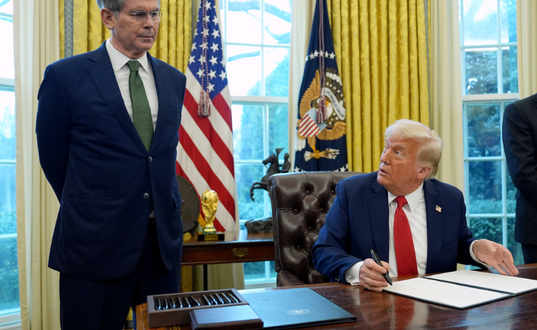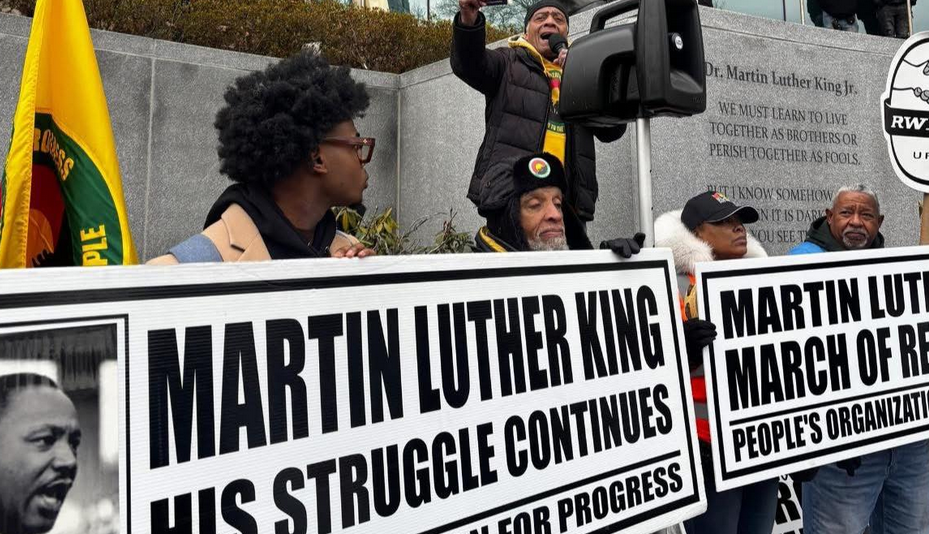Les regaling guests at one of his annual salons. Photo: Colin Benjamin
[Commentary]
Tuesday morning I was having late breakfast at a Spanish restaurant near my home in the Bronx when I got a call from a friend.
“It’s Les,” he said, then paused to give me time to brace myself.
“He passed away,” my friend finally added.
I knew those were the only possible words that could follow such a pause in a phone conversation. My shoulders convulsed. Tears flowed.
A diner at the next table walked over and put his hand on my shoulder. “Whatever it is brother, it’s gonna be okay,” he said.
“I just lost a brother,” I said.
The diner bowed his head slightly then returned to his table.
My friend continued to speak. Les had been seated on the stoop outside his brownstone in Harlem the previous night. He keeled over. A pedestrian saw him. Someone called 911. He could not be revived. Just like that, Les Payne, one of the smartest, most intellectual and forthright journalist was no more.
“I know how much you loved him and I know how much he loved you,” my friend was saying. “I did not want you to read about it. The family did not want you to read about it.”
“Thank you,” I muttered.
I then spoke next with Jamal Payne, Les’ son. Les had a massive heart attack, Jamal said. He died immediately. He was pronounced dead at 7PM Monday night. There was no pain, the doctors said. The family is still in shock.
“He spoke about you all the time. He really respected your journalism. He really loved you,” Jamal was saying. “The family also wants everyone to know we knew how much he was loved.”
Life is like that.
We must embrace and cherish every day. The last e-mail message we traded was on March 3, the day before my birthday. Les had sent me a note responding to my earlier “political economy” review of Black Panther, the movie.
Here’s his message in its entirety:
Milton,
I laid aside your “Black Panther piece until I saw the film Friday so as to approach it with a somewhat informed perspective. Your scholarly analysis of the “Panther” is brilliant.
Armed with the history of Africa’s modern evolution, an understatement granted, you skillfully tread between the reality on the ground and the fantasy on the 3-D screen. Unlike so many critics, your beef was made with precisely what the movie producers delivered on screen and not with what they might have, but did not deliver.
That heroic CIA character, I agree, was a disgrace to the “Black Panther” film, without question. Still, your analysis managed to discard this turd without throwing out the baby, or even the bathwater. Incidentally, it has been my great privilege as a journalist, in addition to all the Black Panthers Party leaders, to have met and interviewed many of those you cite as heroes of the Africa homeland and the Diaspora, men such as Nelson Mandela, Julius Nyerere, Robert Mugabe, Joshua Nkomo, Samora Machel, Milton Obote, Sekou Toure, Malcolm X, and yes a few of the villains such as Yoweri Museveni.
I await your magnum opus on Ethiopia.
Les
I wrote back:
Thanks much Les,
One of these days (when the weather improves) let’s do our infrequent lunch sessions.
The last time I walked away with a good article from your archives.
Best,
Milton
His reference to my Ethiopian magnum opus was to the graphic book I mentioned I was writing, at the end of my Panther review –about Empress Taytu’s exploits at the Battle of Adwa when Ethiopia annihilated an invading Italian invading army on March 1, 1896, and helped preserve her country’s independence. I referred to her in my review as a real-like Black Pantheress,
I will now never get to do that lunch with Les. The story I walked off with after our last luncheon was an interview Les conducted with Dick Gregory in 1971 and published under a pseudonym in a short-lived magazine he produced; at that time his day job made it hard for him to use his name. We ran that interview on The Black Star News’s website on August 29, 2017 under Les’ byline 36 years after he first published it.
Les Payne was one of the smartest and most well-read person I’ve ever met. Calling him a journalist in this era of anti-intellectualism and total disrespect for the facts –beginning in the White House– seems demeaning.
Les started out wanting to study engineering in college. I think he couldn’t bring himself to stand as a mere spectator on the sidelines as history unfolded. He was 76 when he joined the ancestors last night. This means my brother Les –yes, he was like an older brother and mentor– was already in his 20s during the turbulent and epochal 1960s.
That was the era of Black nationalist struggle in the United States and in Africa the “winds of change” led to formal political decolonization. It was also a time of backlash — with the FBI’s COINTELPRO eliminating many of the nationalist movements and their leaders in the U.S.; overseas, the CIA played a role in the demise of Pan-African nationalist.
It was, for awhile anyway, the era of: Malcolm X; Dr. Martin Luther King Jr.; Stokely Carmichael –a.k.a. Kwame Ture; Patrice Lumumba; and Kwame Nkrumah.
How could a conscious, motivated, intelligent young man who knew how to tell stories –having partly grown up in the South in Alabama– like Les Payne be a bystander? He was trim and fit, having run track in college, and he ended up in the military’s press division and saw the disastrous Vietnam War upclose. Later, when U.S. media was looking to change from its all- White reporting staff after the urban uprisings and the damning Kerner Commission Report which excoriated the apartheid-looking newsrooms of America, Les ended up at Newsday.
At Newsday his journalism skills were rewarded when he was part of a reporting team that won a Pulitzer Prize for its coverage of the heroine trail– from its source in Turkey where the poppy seeds were grown, to the streets of New York City, where the devastation was felt.
But, unlike many of our learned sisters and brothers who burst through those closed doors of exclusion and White Privilege, Les opened the window and lowered down a ladder of opportunity. He insisted that Newsday hire more Black reporters; he formed an informal union of Black reporters then later was a founding member of the National Association of Black Journalists (NABJ), which is today a major organization that exerts major impact on national issues.
Les proved that even while working for a “mainstream” media outlet –translation, ‘White”– a brother could maintain his Pan African outlook and thrive. He continued to excel at Newsday, Iater as a columnist and as a managing editor.
Les was drawn to Malcolm X not only because he preached Black nationalism and was very intellectual–moreover Malcolm was self-taught and had good tutoring by Dr. John Henrik Clarke– but because Malcolm truly embraced his African heritage. Like Malcolm, Les Payne knew that collaborations between continental Africans and Diaspora Africans, including in the United States, would contribute significantly towards ameliorating some of the challenges on both sides of the Atlantic. We had many conversations dealing with these dynamics.
Les had just finished what I suspect will become the definitive biography of Malcolm X. He was proud of it and told me there was much original reporting in the book.
Malcolm once said, “You can’t hate the roots of a tree without hating yourself.” Les Payne loved the roots of his tree and so his reporting took him to many parts of Africa. After several rejections by the apartheid authorities he managed to get into South Africa and wrote about the Soweto massacres. He also covered the liberation struggle in Zimbabwe when it was still Rhodesia and even survived the notorious killers of Idi Amin’s State Research Bureau in Uganda.
I personally became a big fan of Les Payne during the 1990s. I read his columns religiously when I attended the Graduate School of Journalism at Columbia. He was one of the most informed journalist–whether writing about local New York issues, national or international news– in the whole country. His columns and presentations were always very well-researched. I later got to meet him when he was invited to speak to students at Columbia.
After graduating from Columbia, I worked as a freelance reporter for The New York Times and later as a reporter and a deputy editor at The City Sun, the renowned –now defunct– Brooklyn weekly newspaper published by the late Andrew Cooper. Through the years, I continued to read and use Les’ columns to hone my own journalistic skills.
It was after I started publishing The Black Star News in 1997 and years later, conducting a free weekly journalism workshop, that my friendship with Les Payne developed and grew. He became a regular guest to the workshop, sharing his reportorial and writing skills with the participants.
During his keynote speech at one of our workshop’s annual dinners Les discussed the many stories stories he covered or edited while at Newsday. When he referred to the Tawana Brawley story as a “hoax” there was some hissing and heckling from some of the guests. He calmly offered to discuss the case with anyone who disagreed with him after his speech, which he completed without further interruption. “I’m a big champion of justice for our people,” Les said. “We must always go with the facts.”
Many guests still disagreed with him but respected him.
After President Obama’s election in 2008, Les and I –often joined by the historian and Amsterdam News reporter Herb Boy– were frequent guests on Gil Noble’s “Like It Is” weekly news show on WABC TV.
We were all friends –Les, Herb, Gil and myself– and some of the best conversations we had were before and after the actual program. (Gil himself was a much esteemed and revered giant–on at least three occasions MTA bus drivers refused to accept my busfare, waving me in. I recall one driver saying “Anyone who’s a regular on Like it Is, doesn’t pay on my bus.” On another occasion an attractive young woman abandoned her seat on a subway train and asked if she could sit next to me–because she had seen me on “Like It Is”).
Les liked bringing people together. He and his wife Violet hosted an annual “salon”; a gathering of journalists, artists, academics, actors and entrepreneurs during the holiday season. It was an occasion to network, make new friends and exchange views on the State of our world. The Paynes dined and wined the guests well. We also enjoyed his impressive collection of African art. His study had long bookshelves lined with books dealing with politics, history, the arts, biographies and many other topics. Royal, who called me with the sad news, was a regular guest and close friend of Les’.
One of the last plans I had — and he had agreed to it- was to interview Les and just have him speak about his life and his role in telling many of the important stories; something like Les Payne in His Own Words. His body of work in journalism best represents his own words. He was generous, kind, brilliant and peerless.
In addition to Jamal and Violet, Payne is survived by another son Haile and daughter Tamara.
I can see Les somewhere, chuckling, as Gil Noble points at his watch –as he always did–when “Like It Is” had to go to a commercial, and say “You know what time it is.”
Les would invariably respond “Time for a break.”
You have done your work Les and earned your break. Rest In Peace beloved brother.







